
Literature Compass
Scope & Guideline
Bridging Literary Traditions with Contemporary Analysis
Introduction
Aims and Scopes
- Interdisciplinary Approaches:
The journal showcases research that crosses traditional boundaries, integrating perspectives from history, cultural studies, and the arts to enrich literary analysis. - Focus on Global Perspectives:
Literature Compass emphasizes literature from a global standpoint, examining texts from various cultures and their interactions, thereby addressing themes of diaspora, translation, and cultural exchange. - Engagement with Contemporary Issues:
The journal frequently addresses contemporary social issues through literary lenses, exploring topics such as race, gender, and environmental concerns within literary contexts. - Historical Contextualization:
A significant aim of the journal is to situate literary works within their historical contexts, allowing for a deeper understanding of their cultural and societal implications. - Innovative Pedagogical Strategies:
Literature Compass also focuses on educational practices, presenting methods for teaching literature across different educational settings and emphasizing the development of critical thinking in students.
Trending and Emerging
- Intersectionality in Literary Studies:
There is a growing trend towards exploring intersectionality, examining how various identities (race, gender, class) converge in literary texts and their implications for understanding societal structures. - Environmental and Ecocritical Literature:
Emerging themes in ecocriticism are increasingly prominent, focusing on literature's role in addressing climate change and environmental issues, reflecting a societal urgency for ecological awareness. - Digital Humanities and Literature:
The incorporation of digital tools and methodologies in literary analysis is gaining traction, enabling innovative approaches to text analysis, visualization, and the study of online literary cultures. - Transnational and Diasporic Narratives:
There is a significant increase in research examining transnational narratives and the experiences of diasporic communities, highlighting the importance of migration and cultural exchange in contemporary literature. - Mental Health and Literature:
Recent publications are increasingly addressing themes of mental health and its representation in literature, reflecting growing societal awareness and the need for discourse around mental health issues.
Declining or Waning
- Traditional Canonical Studies:
There has been a noticeable decline in papers focusing solely on traditional canonical texts, as the journal increasingly prioritizes diverse voices and perspectives over established literary canons. - Static Historical Narratives:
Research that adheres to fixed historical narratives without considering contemporary relevance or interdisciplinary connections has seen a decrease, with more emphasis now placed on dynamic interpretations. - Purely Theoretical Frameworks:
There is a waning interest in articles that rely exclusively on theoretical frameworks without practical application or connection to real-world issues, as the journal seeks to ground literary studies in tangible contexts. - Narrowly Defined Literary Genres:
Papers focusing on narrowly defined genres without broader cultural or interdisciplinary implications have become less frequent, indicating a shift towards more expansive literary explorations. - Regionalism without Global Context:
Themes that concentrate solely on regional literature without addressing its relation to global narratives or movements are appearing less often, as the journal embraces more interconnected approaches.
Similar Journals
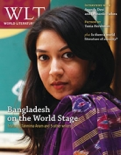
WORLD LITERATURE TODAY
Transforming Understanding of Literature Across BordersWORLD LITERATURE TODAY, published by UNIV OKLAHOMA PRESS, is a premier journal dedicated to the exploration of global literature and its multifaceted cultural implications. With an ISSN of 0196-3570 and an E-ISSN of 1945-8134, this periodical has established itself as an important platform for scholars, writers, and cultural critics from around the world. Since its inception, it has successfully navigated through a diverse array of literary theories and practices, contributing significantly to the discourse within the field, as evidenced by its Q3 ranking in Literature and Literary Theory. Despite its ongoing tenure that extends from 2002 to 2024, it offers no open access options, emphasizing the value of its curated content. Positioned within the United States and housed in the historic UNIVERSITY PRESS BUILDING in Norman, Oklahoma, WORLD LITERATURE TODAY continues to engage and challenge its readers, making it an essential resource for those passionate about the nuances of literature across cultural contexts. Its unique blend of critical essays, interviews, and reviews makes it indispensable for researchers, professionals, and students alike who seek to enrich their understanding of the literary world.
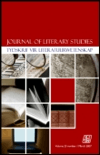
Journal of Literary Studies
Catalyzing scholarly exchange in the arts and humanities.Journal of Literary Studies, published by UNISA PRESS, is a premier open access journal dedicated to advancing the field of literature and literary theory. With its ISSN 0256-4718 and E-ISSN 1753-5387, the journal has established itself as a leading platform for innovative research since its inception in 1985, with a notable convergence period running through to 2024. Recognized in the Q1 quartile of literature and literary theory, the journal ranks impressively at #236 out of 1106 in its category according to Scopus, highlighting its impact in the arts and humanities with a percentile rank of 78th. The journal's open access model, adopted in 2022, reflects its commitment to accessibility and dissemination of knowledge globally, making it an essential resource for researchers, academics, and students alike. With an editorial focus on interdisciplinary approaches and contemporary critical discourse, the Journal of Literary Studies serves as a vital vessel for the exchange of ideas and scholarly dialogue in the intricate landscape of literary studies.

RAMUS-CRITICAL STUDIES IN GREEK AND ROMAN LITERATURE
Bridging Ancient Wisdom with Contemporary InsightRAMUS: Critical Studies in Greek and Roman Literature, published by Cambridge University Press, stands as a premier journal dedicated to the exploration and analysis of classical literary texts. Established in 2002, this journal has garnered recognition in its field, achieving a Q1 category ranking in both Classics and Literature and Literary Theory for 2023, which reflects its commitment to scholarly excellence. With an impressive Scopus ranking, where it places in the 76th percentile for Literature and Literary Theory and the 70th percentile for Classics, RAMUS is a critical resource for researchers, professionals, and students engaged in the study of ancient texts and their lasting impact on contemporary literature. Although currently not an open-access journal, it offers a wealth of peer-reviewed articles, reviews, and critical essays that enrich understanding and foster discussions in the realms of Greek and Roman literary traditions. This journal not only serves as an academic platform but also contributes to the ongoing dialogue on the relevance of classical literature in today's cultural and literary discourse.

Contexto-Revista do Programa de Pos-Graduacao em Letras
Illuminating Contemporary Issues in LettersContexto-Revista do Programa de Pos-Graduacao em Letras is a distinguished open-access journal published by UNIV FEDERAL ESPIRITO SANTO since 2013, effectively contributing to the academic discourse in the field of Language and Literature studies. With its ISSN 2358-9566, this journal offers a platform for researchers, professionals, and students to disseminate and access high-quality scholarly articles that explore various themes in linguistics, literary analysis, and cultural studies. The journal facilitates intellectual exchange within the Brazilian and global academic communities, emphasizing the importance of open access to foster collaboration and innovation in the humanities. By publishing original research, book reviews, and theoretical discussions, Contexto aims to enhance the understanding of language as a vital component in shaping cultural narratives. Its commitment to accessibility ensures that valuable contributions to the field are readily available, serving a diverse audience eager to engage with contemporary issues in letters.
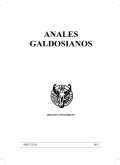
Anales Galdosianos
Celebrating the Influence of Galdós in Hispanic StudiesAnales Galdosianos is a prominent academic journal dedicated to the study of the works and impact of Spanish author Benito Pérez Galdós, providing a platform for innovative research in the field of Spanish literature and culture. Published by the Asoc Int Galdosistas, Inc., this journal serves as a nexus for scholars, students, and professionals interested in critical studies, literary criticism, and historical contexts surrounding Galdós's contributions to literature. Situated within the broader scope of Hispanic Studies, Anales Galdosianos enriches the academic discourse by fostering an understanding of Galdós's influence on narrative forms and social issues during his time. While the journal does not operate under open access, it remains a valuable resource for those engaged in literary research and education. With its commitment to scholarly excellence, Anales Galdosianos continues to uphold Galdós's legacy, inviting submissions that challenge perspectives and deepen our comprehension of this essential figure in Spanish literary history. For further engagement or to submit works, prospective contributors are encouraged to contact Alan E. Smith, Director of the Department of Romance Studies at Boston University.
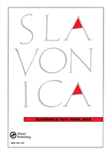
SLAVONICA
Fostering Academic Dialogue on Slavic IssuesSLAVONICA is a distinguished academic journal dedicated to the exploration and analysis of Slavic studies, incorporating a wide array of cultural, historical, and linguistic perspectives. Published by Routledge Journals, Taylor & Francis Ltd, this journal serves as a critical platform for interdisciplinary scholarship, emphasizing the dynamic nature of Slavic cultures and languages. Though it currently does not offer Open Access, SLAVONICA is an important resource for researchers, professionals, and students seeking to engage with the latest academic discourse in the fields of Cultural Studies, History, Literature, and Linguistics, achieving a recognized place in the Q4 quartile across several categories as of 2023. With coverage spanning from 1994 to 2024, and its commitment to fostering academic inquiry, SLAVONICA plays a vital role in elevating the understanding of Slavic heritage and contemporary issues, making it essential reading for anyone interested in the complexities of this region.

Chung Wai Literary Quarterly
Navigating the Landscape of Contemporary Literary ThemesChung Wai Literary Quarterly is a distinguished academic journal published by NATL TAIWAN UNIV PRESS, dedicated to advancing the study of literature and cultural discourse in the Chinese-speaking world. With its ISSN 0303-0849, this quarterly publication serves as a vital platform for scholars, students, and literary enthusiasts interested in exploring contemporary and classical literary themes through a critical lens. Although it does not currently offer open access options, the journal is well-regarded for its rigorous selection process and commitment to scholarly excellence. The editorial team curates a diverse range of articles that encompass literary critique, theoretical explorations, and interdisciplinary dialogues, contributing significantly to the academic conversation in this field. As it continues to bridge the gap between scholarly inquiry and practical engagement with literature, Chung Wai Literary Quarterly remains an essential resource for anyone seeking to deepen their understanding of literary studies and its broader implications.
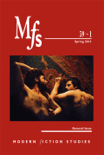
MFS-Modern Fiction Studies
Exploring the Depths of Contemporary NarrativesMFS-Modern Fiction Studies is a premier journal in the field of literature and literary theory, published by Johns Hopkins University Press. With an impressive impact factor and a 2023 classification in Q1, this journal stands out as a vital resource for scholars, researchers, and practitioners interested in contemporary fiction analysis and criticism. The journal aims to foster innovative scholarship, enhance discussions around literary trends, and explore the intricacies of modern narrative forms. Notably, it ranks #119 among 1,106 in the Scopus Arts and Humanities category, placing it within the top 89th percentile. Published four times a year, MFS is committed to making significant contributions to the understanding of modern fiction, making it a must-read for anyone vested in the evolution of literature. Access options are available through institutional subscriptions, ensuring that readers can engage with cutting-edge research and discourse in the literary community.
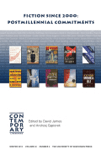
CONTEMPORARY LITERATURE
Illuminating Contemporary Narratives and TheoriesCONTEMPORARY LITERATURE, published by the prestigious University of Wisconsin Press, stands as a vital platform for scholars and enthusiasts within the field of literary studies. With its ISSN 0010-7484 and E-ISSN 1548-9949, this journal has established itself as a respected source of innovative research across various dimensions of literature and literary theory. Holding an impressive Q2 ranking in the 2023 category of Arts and Humanities, this publication not only reflects current trends but also fosters critical discourse around contemporary authors and movements from 2002 to 2024. Engaging articles submitted to CONTEMPORARY LITERATURE enhance our understanding of narrative forms and their cultural relevance, making it an essential read for academics, professionals, and students alike. While the journal is not open access, its impact within the literary community continues to grow, as evidenced by its Scopus rank of #616 out of 1106. For those dedicated to exploring the evolving landscape of literature, CONTEMPORARY LITERATURE is a must-have in one's scholarly toolkit.
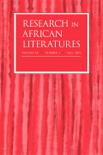
RESEARCH IN AFRICAN LITERATURES
Fostering Interdisciplinary Insights in African StudiesRESEARCH IN AFRICAN LITERATURES is a prestigious peer-reviewed journal published by Indiana University Press, dedicated to the critical exploration of African literary traditions, cultures, and texts. With an ISSN of 0034-5210 and an E-ISSN of 1527-2044, this journal stands out in the field of literature and literary theory, currently ranking in the 80th percentile of its category according to Scopus, making it a significant platform for scholars and researchers alike. Since its establishment, the journal has evolved through converged volumes from 2002 to 2024, consistently fostering innovative discourse and interdisciplinary approaches that illuminate the complexities of African narratives. Although it does not offer open access, the journal is integral for anyone engaged in African studies, providing critical insights that are essential for understanding the broader implications of literature within diverse cultural contexts. The journal's commitment to high standards of scholarship is reflected in its Q3 quartile ranking and its influential contribution to contemporary literary dialogue.